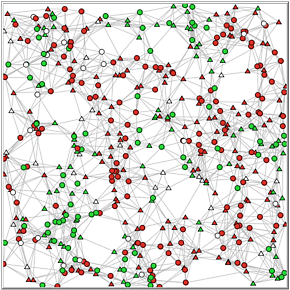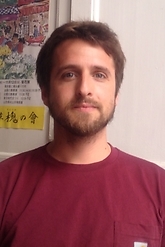July 11, 2019 | News | Tutorial
Introduction to Agent-Based Computational Modelling in Social Science

© MPIDR
The Max Planck Institute for Demographic Research (MPIDR) organizes a tutorial titled "Introduction to Agent-Based Computational Modelling in Social Science” at the 5th International Conference on Computational Social Science in Amsterdam on July 17, 2019.
Social scientists increasingly construe social life as a complex dynamic process, in which macro-level properties of social systems can ‘emerge’ from individuals’ actions and interactions, sometimes in unexpected and unintended ways. The method of agent-based computational (ABC) modelling makes it possible to study such processes, by modelling the behavior and interactions of the individuals that make up societies. As such, ABC modelling can help answering questions that are difficult to answer with other methods in the social science tool box. For example ABC modelling has already helped understanding the social dynamics that can underlie processes of residential segregation and the spread of infectious diseases.
Still, the spread of the approach has been comparatively slow as social scientists often lack the knowledge and skills that are necessary to develop and analyze ABC models. The goal of this tutorial is therefore to familiarize participants with ABC modelling and to provide some basic knowledge and skills necessary to develop ABC models. More specifically, after this course, participants will know about the role that ABC modelling plays in explanation and theory building in the social sciences, will be acquainted with the modelling software NetLogo, and will be aware of some of the advanced topics and issues that they are likely to encounter in the modelling process.
Organizers

© MPIDR, Peter Wilhelm
André Grow (contact person), MPIDR Research Scientist, Laboratory of Digital and Computational Demography
André Grow holds a PhD in Social and Behavioural Sciences from the University of Groningen. In his research, he has applied agent-based computational modelling to study issues of social stratification and family formation. His modelling-related work has been published in outlets such as Population Studies, PLoS ONE, Sociological Science, and The Journal of Artificial Societies and Social Simulation. Recently he has edited the book Agent-Based Modelling in Population Studies: Concepts, Methods, and Applications, which has appeared in The Springer Series on Demographic Methods and Population Analysis. Next to this, he has designed two winter/summer courses on ABC modelling for graduate students at the University of Leuven and has taught a course on simulation methods for undergraduates at the University of Groningen. He has also served on the program committees of several conferences on computational social science. A full CV can be obtained from www.andre-grow.net/cv.

© Daniel Ciganda
Daniel Ciganda, MPIDR Research Scientist, Laboratory of Fertility and Well-Being
Daniel Ciganda obtained his PhD from Pompeu Fabra University, working on the modelling of reproductive decision-making. His work has been published in Demographic Research and the Springer book Agent-Based Modelling in Population Studies: Concepts, Methods, and Applications. He has taught a five day workshop on agent-based computational modelling for graduate students and faculty at the University of the Republic of Uruguay and a one day workshop for graduate student and faculty at the DEMOSOC unit of the Pompeu Fabra University. He currently applies computational approaches to understand how micro-level reproductive dynamics explain macro-level fertility trends. More information can be obtained from https://www.demogr.mpg.de/en/institute/staff_directory_1899/daniel_ciganda_2829.htm.

© Robert Stelter
Robert Stelter, MPIDR Research Scientist, Laboratory of Fertility and Well-Being
Robert Stelter is an economist with a PhD from the Catholic University of Louvain and Rostock University. His research focuses on a wide range of questions related to demographic economics as well as computational demographics and economics. Recent projects model and simulate the long-run dynamics of fertility, mortality and migration and how their interplay effects economic performance. His work has been published in Mathematical Social Science. More information and a full CV are available from: https://sites.google.com/site/rstelter1983/.

© MPIDR
Emilio Zagheni, MPIDR Director, Head of the Laboratory on Digital and Computational Demography, Affiliate Associate Professor at University of Washington, Seattle
Emilio Zagheni (PhD in Demography, UC Berkeley 2010; MA in Statistics, UC Berkeley 2008) is Director of the Max Planck Institute for Demographic Research in Rostock, Germany, and Affiliate Associate Professor of Sociology at the University of Washington, Seattle, where he is also a Data Science Fellow of the eScience Institute. Zagheni is a demographer who uses mathematical, statistical and computationally-intensive approaches to study the causes and consequences of population dynamics. Motivated by the ambition to improve people's lives through the scientific study of our societies, he is consolidating a portfolio that leverages interdisciplinary approaches to monitor demographic change, to explain population processes, and to predict future demographic outcomes. He is best known for his pioneering work on using Web and social media data for studying migration processes. In 2016, he received the Trailblazer Award from the European Association for Population Studies for his pivotal role in developing the field of Digital and Computational Demography. Emilio Zagheni has published in top journals in Demography (e.g., Demography, Population and Development Review, Population Research and Policy Review) and Statistics (e.g., Journal of the American Statistical Association, Biostatistics) as well as in computer science conference proceedings (e.g., WebSci, WWW, WSDM, ICWSM). He co-chairs the IUSSP Panel for Digital Demography. More information can be obtained from http://zagheni.net/index.html.
Program
Tutorial: Introduction to Agent-Based Computational Modelling in Social Science
Amsterdam, July 17, 2019
09:00 a.m. – 10:30 a.m.
Lecture 1: Agent-based computational modelling and its role in explanation and theory building in social science research
10:30 a.m. – 11:00 a.m.
Coffee break
11:00 a.m. – 12:30 p.m.
Computer lab 1: An introduction to NetLogo
12:30 p.m. – 1:30 p.m.
Lunch Break
1:30 p.m. – 3:00 p.m.
Computer lab 2: Implementing a basic social science model in NetLogo
3:00 p.m. – 3:30 p.m.
Coffee break
3:30 p.m. – 5:00 p.m.
Lecture 2: Simulation experiments and empirical data in the simulation process
Course material
For active participation in the computer labs, participants are required to bring their own laptops with NetLogo version 6.1.0 installed (NetLogo is freeware and can be obtained from https://ccl.northwestern.edu/netlogo/download.shtml). The link to the materials for the tutorial will be provided at the beginning of the tutorial.
Contact and applications
Applications for this workshop can be submitted upon registration for the conference (https://2019.ic2s2.org/registration/) and will be handled by the conference organizers. Questions, comments, or suggestions regarding the content of this tutorial can be sent to grow@demogr.mpg.de.